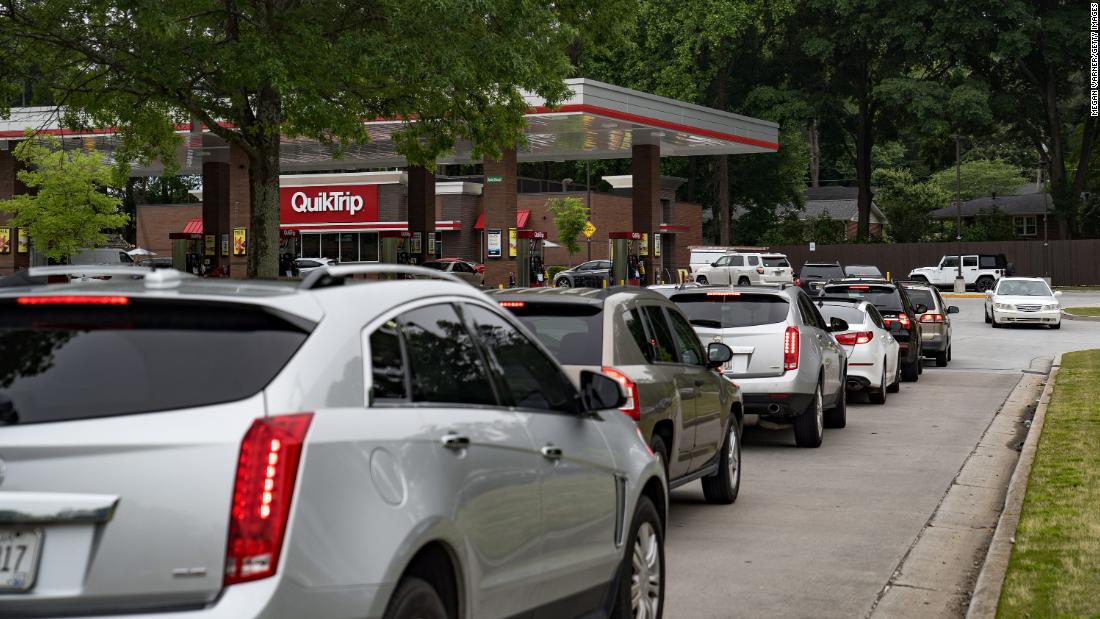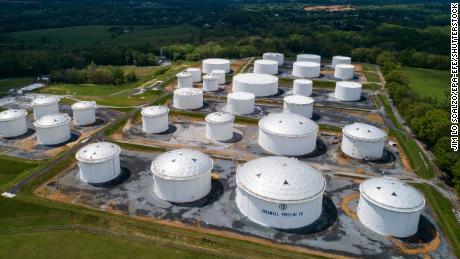Stations in the Southeast run out of gas as people hoard fuel
Outages were also reported in South Carolina (16.2%), Florida (4.6%), Maryland (4.1%), Tennessee (3.6%) and West Virginia (2.8%).
The supply crunch appears to be much worse in some major metro areas. GasBuddy reported outages Wednesday morning impacting 71% of the stations in metro Charlotte, nearly 60% in Atlanta, 72% in Raleigh and 73% in Pensacola.
Some gas stations are being overwhelmed by intense demand following the Colonial shutdown, an industry trade group told CNN Business on Wednesday.
“Demand has been two to four times normal in many markets and the system, even when it isn’t stressed, can’t support that,” Jeff Lenard, vice president of strategic industry initiatives at NACS, the leading trade group for convenience and fuel retailing, said in an email.
Tom Kloza, global head of energy analysis at the Oil Price Information Service, said fears about a gas shortage are “spreading virally,” with Virginia “ground zero” for the rush to buy fuel.
“It’s spreading like a bad rash,” said Kloza.
‘Act responsibly’
Energy Secretary Jennifer Granholm strongly urged Americans not to hoard gas during a White House press briefing Tuesday. She also called on gas station owners to “act responsibly” and avoid price gouging during the supply crunch.
“The American people can feel assured that this administration is working with the company to get it resumed as soon as possible, Granholm said.
Granolm said that Colonial expects to decide by the end of business Wednesday whether to make a full restart. “But even after that decision is made, it will take a few days to ramp up operations,” she said.
“This seems to be turning into a not-enough-truck-drivers-to-get-it-there story,” Patrick De Haan, head of petroleum analysis at GasBuddy, wrote in a tweet.
Army bases impose fuel limits
Despite the supply shock, energy markets are not overreacting. RBOB gasoline futures ticked modestly higher Wednesday and remain up just slightly from Friday.
“East Coast gasoline is running scarce, but what is not moving there is building up on the Gulf Coast,” Michael Tran, RBC Capital’s director of global energy strategy, said in an email.
Some cities and military bases have announced restrictions to ease the strain. The city of Charlotte asked staffers to “limit non-essential travel as a precautionary measure.” Likewise, the city of Raleigh, North Carolina, asked its staff to limit travel and only drive to perform “mission critical duties.”
Three Army bases in Virginia, Georgia and North Carolina are limiting on-base gas purchases to ten gallons. That includes restrictions imposed by Fort Gordon in Georgia, home to the Army’s Cyber Center for Excellence.
Lenard, the trade group executive, called out images on social media showing customers filling up not just their vehicles but any container available.
“That is a big problem,” the trade group executive said. “Not only does that take away fuel from those who need it, it also creates concern over transport and storage, wherever they are going. Just because you have something with a lid doesn’t mean you need to fill it with fuel.”
![]()




